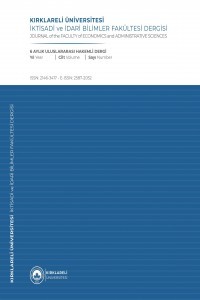ENTEGRE RAPORLAMA VE TÜRKİYE’DEKİ UYGULAMA ÖRNEKLERİ ÜZERİNE BİR ARAŞTIRMA
Amaç:
Küreselleşme,
ekonomik krizler, teknolojik gelişmeler gibi faktörler bilgi kullanıcılarının
bilgi taleplerini arttırmıştır. Mevcut kurumsal raporlama bilgi
kullanıcılarının artan bu taleplerini karşılamada yetersiz kalmış ve bunun sonucunda
yeni bir raporlama şekli olarak entegre raporlama kavramı doğmuştur. Bazı
ülkelerde uygulanan entegre raporlama, Türkiye’deki işletmeler için çok yeni
bir kavramdır. Bu nedenle Türkiye’de entegre rapor hazırlayan işletmelerin
sayısı birkaç işletme ile sınırlıdır. Yöntem: Bu
çalışmada, 2016 yılında Türkiye’de entegre raporlama hazırlayan işletmelerin
hazırlamış oldukları raporların içerik analizi yapılmıştır. Analizde Uluslararası
Entegre Raporlama Konseyi (International Integrated Reporting Council – IIRC)
tarafından hazırlamış olan entegre raporlama çerçevesi esas alınmıştır. Söz
konusu analiz; değer yaratma süreci kapsamında yapılmış ve elde edilen sonuçlar
karşılaştırmalı olarak değerlendirilmiş.
Bulgular: Araştırma
sonucunda, aynı sektörde
faaliyet gösteren işletmelerde bile değer yaratma süreci bağlamında
farklılıklar olduğu tespit edilmiştir. Bu durum entegre raporlamanın Türkiye’de
henüz gelişme aşamasında olduğunu ve entegre raporlama konusunda bir
standardizasyona gidilmesi gerektiğini göstermektedir.
Anahtar Kelimeler:
Entegre Raporlama, Değer Yaratma, Kurumsal Raporlama
INTEGRATED REPORTING AND A RESEARCH ON APPLICATION SAMPLES IN TURKEY
information demands of
information users. Existing
corporate reporting has been inadequate to meet these growing demands of
information users and consequently the concept of integrated reporting has
emerged as a new form of reporting.
Integrated
reporting that is applied in some countries is a very new concept for businesses in
Turkey. For
this reason, the number of enterprises that prepare integrated reports in
Turkey is limited to a few enterprises.Methods:
In
this study, the content analysis of the reports prepared by the enterprises
preparing integrated reporting in Turkey in 2016 was made. The analysis is
based on the integrated reporting framework prepared by the International
Integrated Reporting Council. Relevant analysis was done within the framework
of value creation process and the results obtained are evaluated comparatively.
Results:
As
a result of the research, it was determined that even in the enterprises
operating in the same sector, there are differences in the context of value
creation process. This
shows that integrated reporting is still in development stage in Turkey and a
standardization on integrated reporting should be undertaken.
Keywords:
Integrated Reporting, Create Value, Corporate Reporting,
___
- Altınay, A. T. (2016). Entegre Raporlama Ve Sürdürülebilirlik Muhasebesi. Journal Of Süleyman Demirel University Institute Of Social Sciences, 3(25), 47-64.
- Aras, G., Sarıoğlu, G. U. (2015). Kurumsal Raporlamada Yeni Dönem: Entegre Raporlama. Tusiad, Yayın No: T/2015, 10-564, İstanbul.
- Aydın, S. (2015). Kurumsal Raporlamanın Evrilme Sürecine İlişkin Bir İrdeleme. Mali Çözüm Dergisi/Financial Analysis, 25(130).
- BİST, (2014). Borsa İstanbul Sürdürülebilirlik Bülteni, http://www.borsaistanbul.com/docs/default-source/yayinlar/borsa-istanbul-2014-surdurulebilirlik-bulteni.pdf?sfvrsn=4 (E.T: 01.08.2017).
- BİST, (2014). Şirketler İçin Sürdürülebilirlik Rehberi, http://www.borsaistanbul.com/data/kilavuzlar/surdurulebilirlik-rehberi.pdf (E.T: 01.08.2017).
- Dada, A. (2015). Benefit of International Integrated Reporting Framework to All Economies. The News, http://thenewsnigeria.com.ng/ 2015/11/benefit-of-international-integrated-reporting-framework-to-all-economies/ (E.T: 08.08.2017).
- Erta, (2015). Entegre Raporlama. http://www.entegreraporlamatr.org/tr/. (E.T: 15.07.2017).
- ISSN: 2146-3417
- Yayın Aralığı: Yılda 2 Sayı
- Başlangıç: 2012
- Yayıncı: Kırklareli Üniversitesi
Sayıdaki Diğer Makaleler
Kudret ARMAĞAN, Canan ARMAĞAN, Mustafa BAYSAL, Şükrü KİTİŞ, Nurullah KIRATLI
KÜRESELLEŞME SÜRECİNDE TÜRKİYE’DEKİ SAĞ SİYASİ PARTİLER: AK PARTİ VE MHP
KURUMSAL KİMLİĞİN İŞ DOYUMU ÜZERİNE ETKİSİ
Y KUŞAĞI TÜKETİCİLERİNİN ALIŞVERİŞ STİLLERİ: CİNSİYETE GÖRE BİR ARAŞTIRMA
Hande ARIKAN KILIÇ, Serkan KILIÇ
KURUMSAL SOSYAL SORUMLULUK BAŞARISINA FİNANSAL PERFORMANSIN ETKİSİ
Cengiz DURAN, Ferit KARAHAN, Mürsel GÜLER, Sezer BUDAK
YENİ FİNANSAL YAPI VE PARA POLİTİKALARI
Ferhat BOZTOPRAK, Murat KURNUÇ, Neslihan ÇETİNKAYA
İŞLETME SERMAYESİ YÖNETİMİNİN KARLILIK ÜZERİNE ETKİSİNİN ARAŞTIRILMASI
Fatma KÖSE İÇİGEN, Göksel KARAŞ
